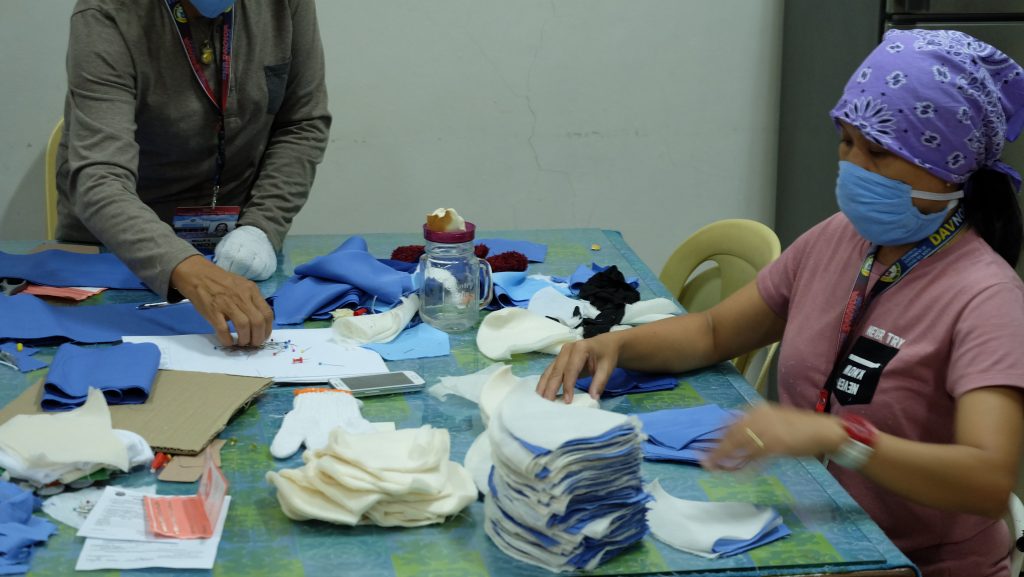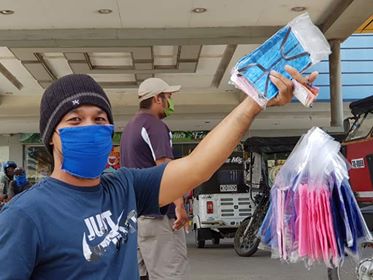DAVAO CITY — When government announced the surging number of people infected with the coronavirus disease (COVID-19), the demand for face masks swelled and nothing was in sight. People went creative, assembling anything available at home to make one, just to be able to cover mouth and nose.
Health experts have repeatedly said that healthy people should not buy masks since they don’t do much to protect them and panic purchasing will deplete the supply for people who do need them the most — like sick patients and healthcare workers.
Still, a great number of government leaders around the globe encouraged people to wear masks, others, on the other hand, imposed “No Mask, No entry” policies.
This prompted abrupt demand ensuing sky-high prices.
Given this bizarre pandemic, the Centers for Disease Control and Prevention (CDC) only recommends masks for a select group of people: Those in a region currently experiencing an outbreak, healthcare workers treating coronavirus patients, and anyone who experiences flu-like symptoms.
But wait, are the improvised face masks a tool to fight the spread of coronavirus disease (COVID-19)?

Disposable surgical masks are mainly used by doctors so they don’t acquire any viruses or bacteria from patients while dealing with them. At the same time, it helps at a certain degree, protect users from transmitting any microbe through droplets of saliva or any discharge from their mouths or nostrils. Contrary to what many people believe in, it doesn’t totally protect healthy people from acquiring any illness. Further, improper use , like a loose fit, for instance, leaves room for error.
The World Health Organization (WHO) maintains that if a person is healthy, there is no need to wear a mask if such person is not handling or taking care of somebody suspected with the infection. If one is showing symptoms or suspected of the disease as a person under investigation (PUI), wearing it is a must. In general, you only wear a mask if you are coughing or sneezing to protect people around you.
Additionally, WHO said that “masks are effective only when used in combination with frequent hand-cleaning with alcohol-based hand rub or soap and water. If you wear a mask, then you must know how to use it and dispose of it properly. ”
These face masks work by capturing droplets from coughs, sneezes and breathing. Without such mitigation, the main transmission of coronavirus evolves within the household and immediate community.

According to a research in the University of Iowa, the “N” in the N95 mask stands for “not resistant to oil” and an N-95 class means that the filtering face mask respirator is at least 95% effective against the sodium chloride aerosol test. This test evaluates particle penetration and air flow resistance properties of filtration materials including face masks.
On the contrary, the Food and Drug Administration (FDA) in the United States reported that the CDC “does not recommend that the general public wear N95 respirators to protect themselves from respiratory diseases, including coronavirus (COVID-19).”
It noted, further, that the best way to prevent illness is to avoid being exposed to this virus. The CDC recommends “everyday preventive actions, such as hand washing, to help prevent the spread of respiratory diseases.” The FDA, likewise, stated that there is no added health benefit to wear a respiratory protective device such as an N95.
On Tuesday, March 25, no less than the Presidential daughter and Davao City Mayor Sara Duterte-Carpio called on Dabawenyos to use the masks recommended by doctors to protect them from infections caused by viruses.
In a report released by the Davao City Information Office on Thursday, March 26, Duterte-Carpio said “doctors do not recommend the use of masks made of cotton because it doesn’t protect from the virus.”
She added that using a reusable masks is not correct as it cannot filter the virus, a reason why doctors did not reccomend such.
On the other hand, the WHO has been consistent in saying that only two types of people should wear mask: Those who are sick and show symptoms; and those who are suspected to have the coronavirus. Apart from them, no one should. It added that a face mask is not a reasonable protection given that current research shows the virus is spread by droplets and contact with contaminated surfaces.
For those who need it, WHO provides specific reminders: “Before putting on a mask, clean hands with alcohol-based hand rub or soap and water; Cover mouth and nose with mask and make sure there are no gaps between your face and the mask; Avoid touching the mask while using it (if you do, clean your hands with alcohol-based hand rub or soap and water); Replace the mask with a new one as soon as it is damp and do not re-use single-use masks; To remove the mask: remove it from behind (do not touch the front of mask), discard immediately in a closed bin, and clean hands with alcohol-based hand rub or soap and water.”

For Carlito Ikdang, a construction worker, wearing a mask whatever it is made of, is necessary to protect himself from the virus. He added that he cannot afford to buy the right face mask.
“Maayo ang katong parehas sa mga doktor pero mahal man, wala koy budget, bahala ug panapton basta dili lang kalusot ang laway (It is good to have face masks like the doctors use, but they’re expensive and I don’t have the budget. I don’t care if it’s made of cloth, what is important is that saliva cannot go through),” Ikdang said.
The city government, through the City Transport and Traffic Management Office (CTTMO), Davao City Police Office (DCPO), and Task Force Davao, are distributing masks to Dabawenyos every morning at assigned spots all over the city.
The city government has distributed over 8,000 masks for weeks now.
Still, Duterte-Carpio said the best way to protect oneself is by frequent hand washing or using alcohol-based rub, social distancing and, practice respiratory etiquette -covering one’s moth with handkerchief or flexed elbow when coughing.
“Putting on a mask every day before you go out is like a ritual, like putting on a uniform, and in ritual behaviour you feel you have to live up to what the uniform stands for, which is more hygienic behaviour like not touching your face or avoiding crowded places and social distancing,” said Donald Low, a behavioural economist and professor at the Hong Kong University of Science and Technology.
